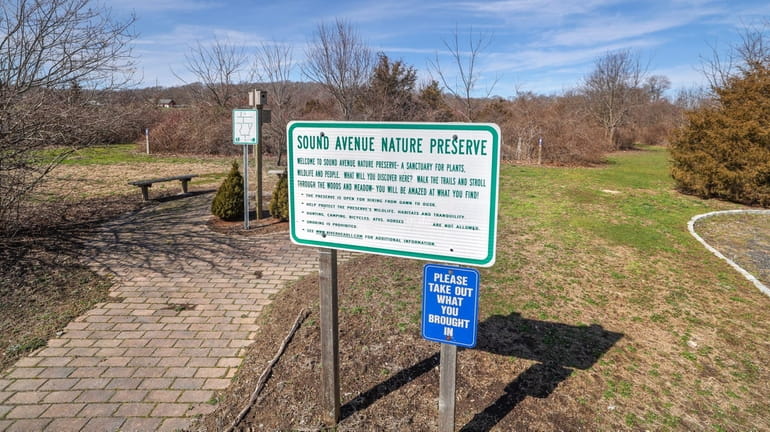State audit finds Riverhead did not properly keep records of land preservation fund

Riverhead acquired the Sound Avenue Nature Preserve, seen Friday, using money from the Community Preservation Fund. Credit: Newsday/John Paraskevas
The state comptroller’s office criticized Riverhead for poor record-keeping of its administration of a fund that generates revenue for land preservation and water quality initiatives.
The audit looked at how the five East End towns collected and disbursed money from the Community Preservation Fund and whether proper records were kept over a two-year period from Jan. 1, 2021, to Dec. 31, 2022. The fund generates revenue from a 2% tax on real estate transfers.
"Not all town personnel involved in the CPF collections process were aware of the collection procedures, and delivery of the CPF collections checks between Town offices and departments through interdepartmental mail was often delayed," auditors wrote in their report.
The audit report released Wednesday found Riverhead did not properly record dates money was received nor did officials make deposits in a timely manner, possibly in violation of state law requiring deposits be made within 10 days.
WHAT TO KNOW
- A state audit found Riverhead did not keep accurate records of money collected through the Community Preservation Fund.
- The two-year audit examined how each of the five East End Towns handled the fund, which generated revenue for land preservation and other initiatives.
- Collectively, the fund generated $403.6 million in revenue during the audit period.
During the audit period, Riverhead had 27 collections totaling $15.5 million.
The probe found Riverhead officials did not record dates for seven of those collections. Without dates, auditors were unable to determine whether $5.3 million of the 27 collections were deposited in the required time period.
Of the 27 transactions, state auditors found that nine deposits were made from 18 to 28 days after they were received.
The tax on real estate transfers is collected by Suffolk County and remitted to the towns monthly. Towns oversee use of the funds.
Deputy Town Attorney Annemarie Prudenti said Thursday the county is supposed to deliver the payments to the town's accounting department, a process that was "inconsistent." Checks were sometimes delivered to the supervisor's office or town attorney's office before being sent to the accounting department, which at the time was in a different building.
Auditors said proper procedures weren’t followed throughout the audit period, which town officials in their response blamed on county employee turnover and other disruptions, including the COVID-19 pandemic and county cyberattack.
Riverhead’s new procedures call for a town official to retrieve checks from the county comptroller’s office and deliver them to the town’s accounting department. Then, a town police officer deposits the checks at the bank.
"We are taking it upon ourselves now to make it a more effective, consistent process," Prudenti said.
Responding to the findings, former Supervisor Yvette Aguiar wrote a letter to the state comptroller’s office in December saying the county changed its “routine practice” of delivering payments to the town financial administrator directly, instead leaving them at the town’s welcome desk.
Aguiar also wrote that the county cyberattack affected timely delivery of payments from Suffolk County, since the Sept. 8, 2022, attack impacted software and services associated with real estate transactions.
Suffolk County Comptroller John M. Kennedy Jr. downplayed the impacts of the cyberhack in an interview Friday, noting the attack occurred just three months before the audit period ended.
Before the pandemic, his staff did sometimes deliver checks as an "accommodation" to the East End towns, a practice that stopped during the pandemic and staffing shortages.
"My office has no obligation to deliver anything to anybody," Kennedy said. "It's up to the towns. They want their money, they've got to get to us or it goes in the mail."
The auditors recommended Riverhead officials train employees who receive collections to follow procedures and maintain complete records.
The audit also examined records for the towns of East Hampton, Shelter Island, Southampton and Southold, finding those towns properly recorded and allocated funds.
The Community Preservation Fund generated $403.6 million over the audit period, the report said.
Southampton received the lion's share of those funds at $224.4 million, followed by $127.2 million in East Hampton. Southold got $28 million while Riverhead took in $15.5 million and Shelter Island raised $8.5 million.
Revenue has topped $2 billion across the East End since the fund’s inception in 1999, according to data from Assemb. Fred Thiele’s office.
Riverhead has used CPF money to acquire properties for open space and recreation, including a kayak launch site on West Main Street, the waterfront Miamogue Point Park in South Jamesport and Sound Avenue Nature Preserve in Riverhead.
In 2023, the fee was raised by half a percentage point in East Hampton, Shelter Island, Southampton and Southold for a new affordable housing fund. Riverhead opted out of creating that fund.
